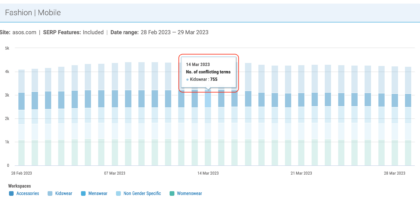Suspicious flux – The canonical tag
26 Apr 2016|2 MIN READ
Our CTO Jon Earnshaw took to the stage once more to present Pi Datametrics unique research and comprehensive findings on suspicious SERP flux, in the context of Ecommerce.
Focussing on Pi Datametrics' client Waterstones, Jon identified two forms of cannibalization and worked through these issues with Waterstones to stabilise rankings.
View Jon's slides here:
Watch Jon's talk here:
https://www.youtube.com/watch?v=2A0EZNSHfWw
Suspicious flux: Internal cannibalisation
Using data from our enterprise SEO platform, Jon showcased the effects of duplicate content across Waterstones' book portfolio and stated that, while Waterstones books came in many forms and varieties (paperback, hardback, audio books, ebooks etc.), their synopses and descriptions were the same, which caused a lot of confusion in the SERPs.
Pi Datametrics Position Explorer Chart: Waterstones hardback and paperback books conflict in Google
He explained that this is fast becoming a major issue in Ecommerce for any company with multiple products that exist in multiple varieties.
Suspicious flux: Introducing the canonical tag to regain positions
With the "Canonical Book Formula", Jon showed how Waterstones managed to work through their internal cannibalisation issues. At each stage of the book lifecycle, Waterstones needed to choose a "Canonical Book" to direct authority to in the SERPs.
Hardbacks and paperbacks, as non-differentiated objects, would return for the same search query, so it was important that Waterstones communicated to Google which one they needed to rank at a given time, as well as which one needed to be taken out of the crawl space.
Suspicious flux: External cannibalisation
Jon Earnshaw then moved on to the issue of external conflict, as Waterstones book reviews and content was stolen or partially duped by similar sites like Harper Collins; causing their rankings to nose-dive and losing them vital presence in the Google Knowledge Graph.
Pi Datametrics Position Explorer Chart: Waterstones are usurped in Google by a content thief
By appropriating Waterstones' content, Harper Collins had jumped up 99 places into their exact former position.
With the advice of Pi, Waterstones re-wrote their book descriptions with unique, relevant content and regained their rankings and Knowledge Graph status almost instantly (within 10 hours).
Suspicious flux - Jon's key takeaways:
- Work out who else is using your content...
- With people you know, make sure you have a 3rd party content strategy in place, and find the people you don’t using data!
- Use data - lots of it!
- Utilise historic SERPS data
- Always investigate suspicious flux (look within + or - 2 positions)
- Don’t be afraid to minimise crawlspace
- Don’t abandon the keyword game just yet!
- Begin inside the mind of your customers
- Use this insight to shape your content
- Follow the flowchart...
View Jon's content flowchart here:
If you suspect that your site is suffering from internal or external cannibalisation, and would like to see how Pi could help you recover your positions, don't hesitate to get in touch:
Never miss a post
Join our mailing list and have our SEO news delivered straight to your inbox.
Never miss a post
Join our mailing list and have our SEO news delivered straight to your inbox.










